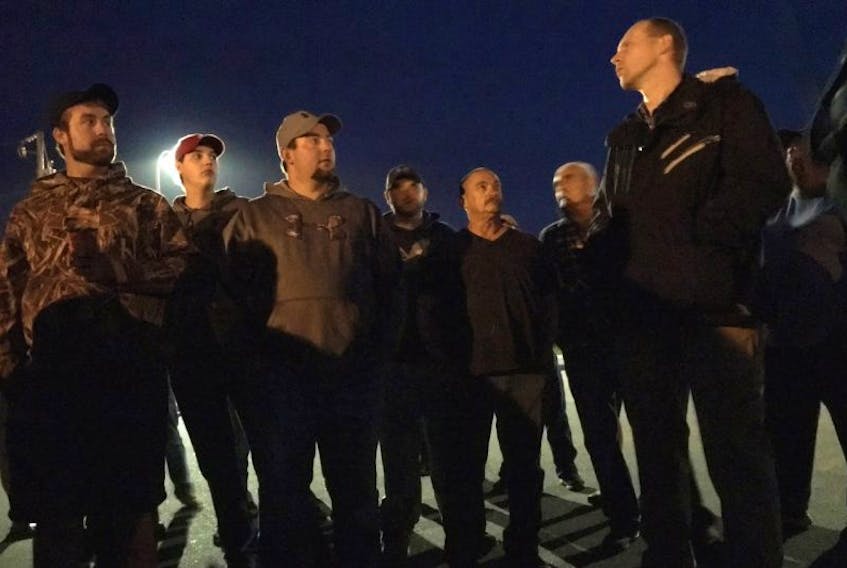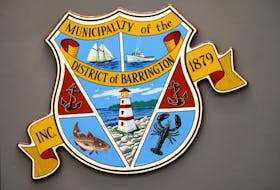Fishermen first gathered peacefully in the parking lot the evening of Sept. 6 and were back the evening of Sept. 7. The RCMP have also had a presence on and around the wharf, keeping an eye on things. During the Sept. 7 gathering RCMP Sergeant Stephen Power of Windsor spoke with fishermen to get a better understanding of why they were there.
“I’m not here to do an investigation and I’m not here to arrest or charge anyone,” he said. “They just asked me to come in and help in any way I can. I want to hear what you have to say.”
“The problem in a nutshell, apparently there’s a little poaching going on over what’s allowed by individuals,” said Jimmy Conrad, a local fisherman. “I don’t think all of them are who they say they are or claim to be.”
While fishermen know there is an Aboriginal court-upheld treaty right to fish for food, social and ceremonial purposes, they believe sales of catches are happening as well.
Disagreement over what is, or isn’t, taking place has spilled onto social media, where there has been a robust dialogue on Facebook. Comments, sometimes from both sides, have been defensive, accusatory and/or contain a lot of colourful language we can’t print. In other cases there have been attempts to draw calm into the matter and to remind others that fishing for food, social and ceremonial purposes is allowed, whether fishermen agree with that or not.
“We’re not looking for a confrontation. We want to be left alone to fish in peace,” said one Aboriginal fisher.
“Our community (food, social, ceremonial) vessel fishes to feed an entire community multiple times throughout the entire year,” posted another person. “This lobster is used for elders, children, adults, special events, community outreach and ceremonial purposes…It is for the entire community as a whole.”
It's the belief that some are abusing the food fishery that has fishermen concerned and angry.

The gatherings on the wharf have not been called by a specific organization, but a local fisheries association isn’t surprised to see fishermen expressing their concerns.
“Fishermen think there is a fair amount of lobsters being landed and unfortunately instead of going where they’re supposed to be going, for the food and ceremonial purposes, there’s a good portion, they believe, being used for sale,” says Bernie Berry of the Coldwater Lobster Association.
Berry says it is a complicated issue because of the Aboriginal fishing rights that do exist.
“We all fish together in the commercial season, but I think there is room for improvement, certainly, in this food and ceremonial fishery. If it was just being used for that, I think people would accept it,” he says. “But for whatever reason it seems like there’s more uptake in activity this year, seems there’s more people involved. The concern is how this product is being used, if it’s being used for sale and not for what it’s intended for.”
DFO STATEMENT
Asked for comment about the concerns of fishermen, versus the rights that do exist for Aboriginal fishers, the federal Department of Fisheries and Oceans provided this statement: “The Supreme Court of Canada ruled that there is an Aboriginal right to fish for food, social and ceremonial (FSC) purposes. After conservation, this right takes priority over other uses of the resource. We expect orderly conduct of all participants.”
The department says its Conservation and Protection Directorate is tasked with ensuring compliance and enforcement of the Fisheries Act and all licences and conditions for commercial, recreational and Indigenous fisheries.
“The buying, selling, trading, bartering, or the offer to buy, sell, trade or barter food, products harvested for food, social and ceremonial purposes is not permitted, and Conservation and Protection fishery officers will investigate reported violations,” read the statement. “DFO, including Conservation & Protection, continues to work with Indigenous groups to promote a responsibly managed and sustainable FSC fishery.”
Asked if the department has received complaints of possible commercial fishing, department communications advisor Stephen Bornais said, “This is the extent of our response at this time.”

The Tri-County Vanguard reached out to some Aboriginal fishing organizations but was unable to find someone available or willing to speak on the matter at the time this story was written.
Meanwhile, back at Lobster Rock Wharf the evening of Sept. 7, Sgt. Power encouraged fishermen who have concerns to meet with stakeholders and leaders to “see if we can get to some common ground and find a solution.”
Said Conrad, “We just want somebody higher up the food chain to be aware that the regular fishing dudes are upset. Why are these normal guys, family guys that are running businesses, and hiring people, why are they standing in a parking lot at 8, 9 o’clock at night? What’s got them so aggravated?”
(With files from Carla Allen.)









